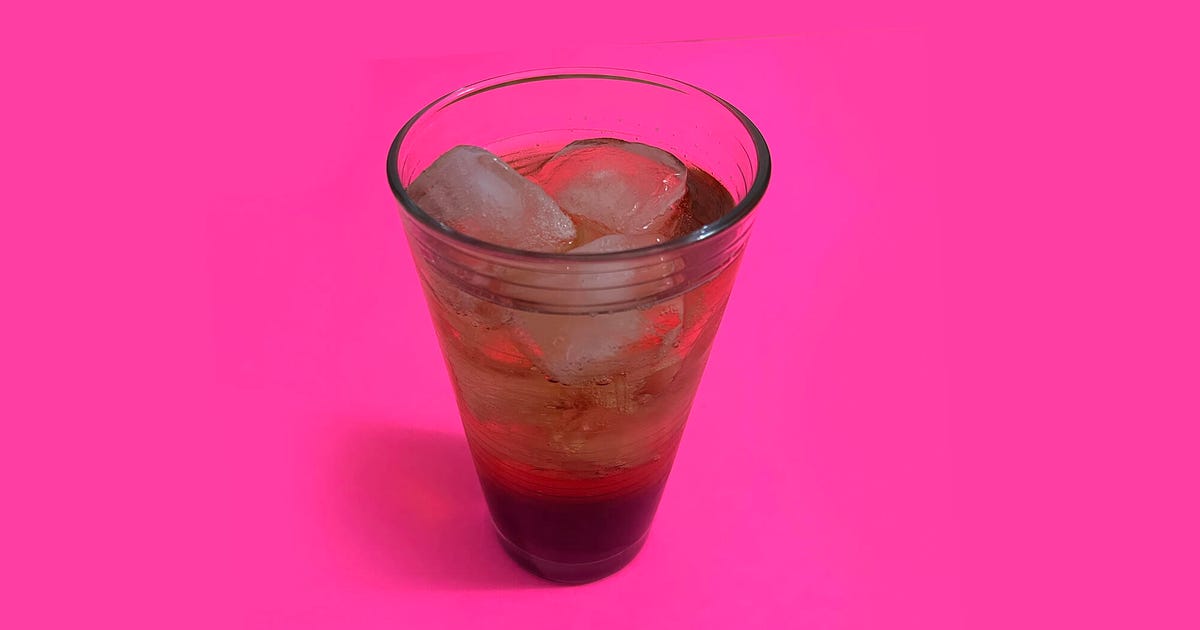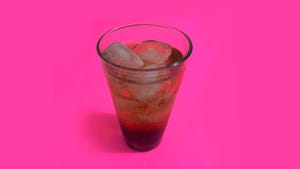
From an oral care perspective, the “healthy Coke” trend isn’t any healthier than consuming a regular soda. “The pH of vinegar is about 2 to 3, which is around the same level of acidity as a full sugar Coke or a Diet Coke, meaning it’s equally as detrimental to the enamel in high volumes,” said Dr. Joyce Kahng, a California-based cosmetic dentist. “For reference, tooth enamel demineralizes at a pH of 5.5, so regardless of whether it is a regular Coke or not, both are unhealthy for teeth.”
Just when we thought TikTok couldn’t bring about any weirder trends, its latest craze known as “healthy Coke” has raised questions and confusion among experts and users alike. If you haven’t heard of it, “healthy Coke” became a phenomenon after TikToker Amanda Jones said it was a healthier alternative to the soft drink. It consists of ice, balsamic vinegar and sparkling water. Yes, you read that right: Balsamic vinegar — the ingredient you add to salad dressings. The idea is that the mixture is supposed to taste like Coca-Cola. But does it really?
Gabriela Barreto, a registered dietitian and sports nutritionist, agrees, noting that the trend perpetuates the notion that there are good versus bad foods or beverages. “It implies that sugar is the enemy and that there are certain foods that will make or break your health, which is all a product of diet culture,” she said. “By assigning foods a moral value, we reiterate the idea that eating these foods means that you are doing something wrong or bad and that continues to grow a negative relationship with food for many people.” As a result of these habits, many people end up developing disordered eating.
‘Healthy Coke’ contributes to diet culture
If you choose to drink “healthy Coke” or other carbonated beverages, Kahng suggests drinking it within a short time frame or with a meal. “Sipping on something that is acidic over a long period of time is the worst thing you can do because it prolongs an acidic pH intraorally,” she said. “Remember that the carbonation and flavors reduce the pH into the acidic zone, which is not great for teeth.”
Similar to other carbonated beverages, “healthy Coke” is highly acidic. Every food and drink has a pH value that indicates how acidic or alkaline it is. To determine the acidity level, the product is usually tested using pH strips or a pH meter, and then measured against a pH scale, which has a range from zero to 14. Water, for example, is considered neutral, and has a pH value of 7. Anything with a pH value below 7 is considered acidic, and anything with a pH value above 7 is considered low in acid, or alkaline.
She acknowledges that while soda contains sugar, she doesn’t believe that sugar is something to be feared. “The more fearmongering we place around certain products or ingredients, the worse our relationship with food gets,” she said. “And we know from growing research and experience, this doesn’t work in improving people’s health at all, because it leads to more restrictive dieting, which ends up worsening not bettering one’s health.”
Now that you know that “healthy Coke” may not be worth the hype, you’re probably wondering if you’re better off drinking the real deal or the diet version. “Soda has been branded as one of the main culprits and major causes for metabolic diseases such as diabetes and cardiovascular disease, but metabolic diseases are very complex,” said Barreto. “There are many factors including genetics, environment, overall lifestyle, socioeconomic status and more.”
It’s just as acidic as soda
The information contained in this article is for educational and informational purposes only and is not intended as health or medical advice. Always consult a physician or other qualified health provider regarding any questions you may have about a medical condition or health objectives.
If you’ve tried the “healthy Coke” trend and genuinely like it, then, by all means, drink away. But if you’re not into it, that’s okay, too — you can opt for the real deal or the diet version instead. The most important takeaway from this is that not every food or drink needs to be “healthified,” and you should be able to enjoy your favorite foods or drinks in their original form. According to Byrne, “There’s no need to create ‘healthier’ versions of your favorite foods because these swaps will never satisfy you the way the real thing will.”
One of the big issues with “healthy Coke” is that it’s another trend rooted in diet culture. “This is a lower-calorie alternative to drinking regular soda, and many people think that makes it automatically healthier, and that’s not the case,” said Christine Byrne, a North Carolina-based registered dietitian who specializes in eating disorders.
Possible health risks involved
Everyone knows drinking sodas regularly isn’t the best thing for our health, but is it really worth replacing it with a fizzy, vinegar-based drink? TikTok is known to be influential on teens, so it’s concerning that they’re being told that they should drink vinegar instead of a soda if they’re craving the beverage. With all the latest wellness trends on TikTok, it’s easy to get consumed in that world, but should you believe everything you see?
Overall, Barreto thinks diet soda is a good alternative for people who enjoy the taste of soda but have to monitor their blood sugar levels, such as those with diabetes. Byrne points out some people may experience bloating and bad breath from drinking diet soda. “Just as with regular Coke, and even “healthy Coke,” it’s unlikely that drinking diet sodas sometimes will have any huge impact on your health, good or bad, because no single food or drink is powerful enough to do that.”
It’s important to reiterate that just because something is trending on TikTok doesn’t mean it should be copied. It’s healthy to question viral trends and ask yourself how they could be harmful or helpful. If you’re ever in a bind, it’s best to err on the side of caution and ask a professional first.
You’re better off drinking the real deal
It’s important to know that the “healthy Coke” trend may not be suitable for everyone who wants to try it. People who have issues with their esophagus and acid reflux should avoid this trend. “For someone with gastroesophageal reflux disease, such an acidic and bubbly drink could cause acid reflux, although the same is true for any kind of sparkling drink, as well as anything with lots of acid,” explained Byrne.
“Consuming that amount of balsamic vinegar, which is highly acidic at a pH of 2 to 3, in a beverage can be harmful,” said Barreto. This is because highly acidic beverages can erode tooth enamel, irritate your esophagus and create or worsen acid reflux. “Generally, when we consume balsamic vinegar in a salad, there are other ingredients and the content of balsamic vinegar is not that high,” she added.
To find out, I spoke with a couple of dietitians and a dentist. Here’s what they had to say about this latest TikTok trend.
As far as diet soda goes, there’s been speculation over the years about its health value, but evidence is lacking to support this. Although the long-term effects of artificial sweeteners is still up for debate, it’s generally safe to consume. “There are many myths out there about diet soda, such as that it will actually increase your blood sugar, increase insulin response, make you crave more sugar and so forth,” said Barreto. There are even claims that artificial sweeteners can cause changes to your gut bacteria, which isn’t entirely false. “While this is potentially true, the dosage that can cause harm or changes is much higher than that found in a single can of diet Coke,” she said.
Bottom line
“Regular coke isn’t something you should drink at every meal, but as part of a nourishing overall diet, it’s fine to have one sometimes,” said Byrne. If you drink soda, she added, it’s best to pair it with a meal or snack, because getting many nutrients (not just sugar) will help keep your blood sugar more stable.
For most people, there aren’t any physical health risks to be concerned about, according to Byrne. However, If you’re on medication and worried about a potential interaction, always ask your doctor or pharmacist first. Overconsumption of sugary drinks is not good for us because it puts us at risk for Type 2 diabetes, hypertension, cardiovascular disease, osteoporosis and much more. But let’s be honest, when you opt to drink a soda, chances are you aren’t drinking it for its health benefits. You drink it because you crave the sugar, carbonation or caffeine, or simply because you enjoy it.




